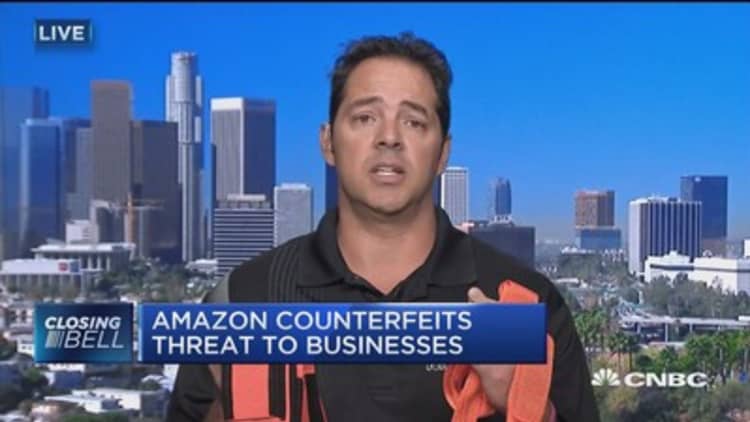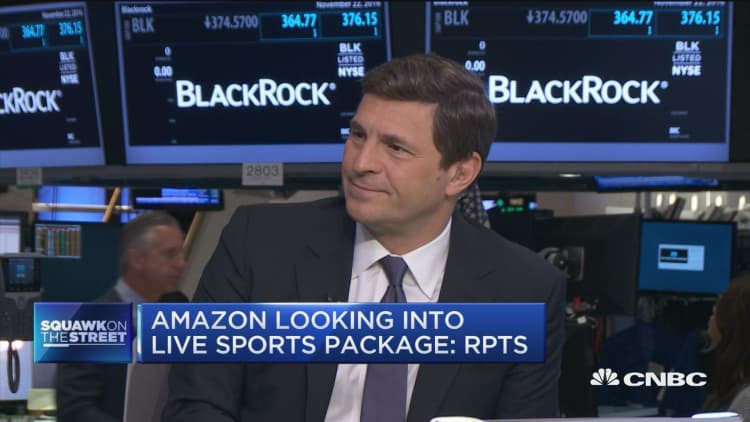Amazon.com sellers have for years e-mailed Jeff Bezos personally when they were unable to resolve their problems elsewhere.
Jeff@amazon.com has evidently been overburdened by complaints.
From a surge in counterfeiting and a constant fear of suspensions to sudden policy changes that left sellers sitting on mounds of inventory, it's been a tumultuous year for merchants. As consumers prepare to open their wallets for Black Friday and Cyber Monday, sellers are on edge.
Chris McCabe, a former Amazon employee who now helps suspended sellers get reinstated and stay compliant, has in the past resorted to forwarding cases to Bezos when the standard seller support route failed. Elevating cases to the CEO's office no longer leads to quick resolution.
"Messages to Jeff are now resulting in the same canned generic responses," said McCabe, who worked at Amazon from 2007 to 2012. "That's becoming just an ordinary queue."
Welcome to holiday madness, 2016.
Here's the version that Amazon is touting.
In a press release on Thursday, the Seattle-based company said that it's gearing up for a "record-setting" season by making more products on the third-party marketplace available to Prime members and providing tools to help sellers ship items faster.
The marketplace of small businesses and entrepreneurs now accounts for half of all units sold. Amazon has rolled out tools to let those merchants submit deals, adjust pricing to meet market demand and promote items on the mobile app. Sellers include brand creators, private label owners and retailers of other people's products.
"We're dedicated to making the fulfillment technology that Amazon develops available to sellers," Peter Faricy, vice president for Amazon Marketplace, said in the release.
While that all may be true, many sellers describe an environment of chaos that's designed solely for the benefit of consumers.
Having the widest selection at the lowest prices with the fastest shipping leaves buyers with a diminishing reason to shop elsewhere and sellers increasingly reliant on Amazon. The site accounts for 38 percent of U.S. consumer e-commerce, according to Slice Intelligence.
Online sales is expected to jump 17 percent this holiday season, compared with 3.3 percent for all of retail, according to data from eMarketer. At $94.7 billion, e-commerce will represent 10.7 percent of the total, the highest ever.
For Fred Ruckel, the weeks leading up to Thanksgiving have been punishing. Ruckel is the creator of the Ripple Rug, a cat activity mat. Sales of Ripple Rug, long a best seller in its niche category, have plunged 85 percent in the past two weeks since Amazon took over the listing page, altering the text and eliminating all but one of the photos.
Amazon shares
An Amazon representative told Ruckel the company assumed control to improve the listing. Instead, Ruckel said the changes were "immediately detrimental." He's yet to get an explanation.
"I have called every single day since losing control," Ruckel said in an e-mail, adding that he's sold 10,000 units on Amazon this year. "Biggest holiday week and I cannot even say 'makes the perfect gift.' So bizarre."
Amazon didn't offer CNBC.com a response to Ruckel's story. A spokesperson said in an e-mail that, "We think of sellers as customers. Our dedicated Seller Support team is available 24x7 to assist sellers by investigating issues and taking the appropriate actions."
Amazon is closing out November on a tear, with the stock having bounced back from a postelection slump. The company is poised for record profit and its fastest year of sales growth since 2011.
Share prices have gained 16 percent this year, closing on Tuesday at $785.33.
Investors aren't paying much attention to the darker side of Amazon, the one that's rife with infringement and seller complaints so familiar to Ruckel and McCabe.
Counterfeiting has become such a problem that Amazon filed its first two lawsuits ever against infringers last week. In October, Apple filed a lawsuit against a seller of knock-off chargers and cables on Amazon.
In addition to legal action, Amazon has tried clamping down on infringement by forcing third-party sellers to show proof that they're selling authorized products of big brands like Nike and Hasbro. The company is also suspending sellers at a hastened pace.
It's like a zombie you can't kill.Lesley Hensellpartner at eGrowth Partners
At eGrowth Partners, an Amazon sellers' advocate, business has doubled this month, said Lesley Hensell, a partner at the Dallas-based firm. Suspended sellers are seeking reinstatement, and other clients are aiming to get certain products relisted after Amazon booted them for various reasons.
A recent development, according to Hensell, is an "at-risk" alert that sellers are seeing for items deemed unsafe or inauthentic. On their dashboard merchants can see metrics related to their performance, including how many problematic items they've sold based on user feedback.
Hensell said these notifications could be helpful, serving as early warnings of what needs to be fixed. However, she said many of the alerts are referring to old issues that her clients already settled in recent months. So instead of providing clarity they're just causing confusion.
"It's particularly frustrating for our clients," Hensell said. "They paid us money, we got them cleared, and now all of the sudden it's back. It's like a zombie that you can't kill."
Of course, there's still plenty of potential prosperity for businesses on Amazon. The user base of 300 million-plus keeps growing, and Amazon continues entering new markets, whether its custom printed T-shirts, groceries or automobile research.
In 2015, Amazon introduced Launchpad, a site to help start-ups get discovered and to give customers access to a broader array of products. As part of the rollout, Amazon partnered with CircleUp, a site that independent retail brands use to raise money from investors.
CircleUp currently has 141 products on Launchpad, including leak-proof reusable bags from BlueAvocado, infant cereal from NurturMe and a Belle Chevre do-it-yourself cheese kit.
"Amazon has dramatically lowered the cost of distribution, enabling more small brands to reach huge audiences," said Ryan Caldbeck, CEO of San Francisco-based CircleUp. It's also forcing traditional stores to support start-ups because "if they don't, these big retailers will lose sales as people go to Amazon for a wide variety," he said.
No matter the category, merchants have to be more vigilant about protecting their brand on Amazon as well as promoting it.
On Cyber Monday 2015, sellers received orders for over 23 million items, an increase of more than 40 percent from the prior year, Amazon said. Competition for visibility is fierce, and consumers are increasingly starting their search at Amazon, not Google.
Add it all up and Amazon is becoming a big advertising business. Ad sales are predicted to climb 9.1 percent this year to $1.3 billion, according to eMarketer, as sellers seek prime placement in a crowded market.
Worldwide digital ad revenue
| Click to edit | 2015 | 2016 | 2017 |
| $53.05 | $63.11 | $72.69 | |
| $17.08 | $25.94 | $33.76 | |
| Yahoo | $3.32 | $2.98 | $3.00 |
| Microsoft | $2.75 | $3.16 | $3.54 |
| $1.99 | $2.26 | $2.53 | |
| Verizon | $1.34 | $1.41 | $1.47 |
| Amazon | $0.94 | $1.21 | $1.32 |
Source: Source: eMarketer
"It's silently becoming an advertising giant," said Alasdair McLean-Foreman, CEO of Teikametrics, whose software helps Amazon sellers manage shipments, optimize restocking and run ads. "It shifts the economics, and now you're paying to get first-page placement."
The frustration for many sellers is that their costs continue to rise because of the competition, but Amazon isn't fixing their problems.
As long as the company keeps serving customers with more products and now content at the best prices, seller issues will likely stay on the backburner.
That's the Bezos way. He's obsessed with pleasing the buyer, and according to experts who study brand affinity, Amazon is doing that job exceedingly well.
"The health of the customer relationship overall is very solid," said Steve Beck, managing partner of management consultancy cg42. "Trust in the brand is very high."


